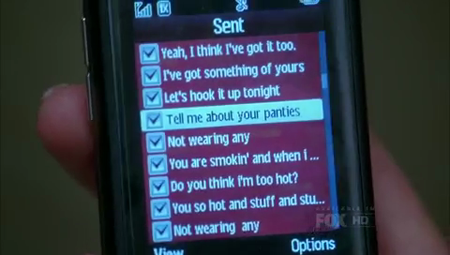uKnowKids is pleased to announce that we have released our eBook entitled "Understanding Sexting: Nine Things Every Parent Should Know"! This eBook is free of charge to the public and jammed full of imporant information for parents of digital kids! After downloading and reading this eBook, parents will learn:
The Importance of Parental Monitoring of Text Messages
What you need to know about text message monitoring and digital parenting this holiday season.
Parents often want two things: to be the "cool" parent, and to be the parent that can trust their children no matter what. Unfortunately, in the age of texting and social media, trust is usually a luxury parents cannot afford. In fact, for young children especially, it's a parent's responsibility to monitor their children's online habits to make sure they are using the power of modern day technology safely.
Snapchat and Sexting: Defined and Dethroned
With Snapchat making the headlines a lot the past few weeks, uKnowKids thought it would be very helpful to decode this app for you and show you exactly why using this app as a means to send nude or semi-nude pictures is a bad, bad idea. And why sharing intimate photos in general is never a good idea.
Snapchat is a unique app that lets users take and then send pictures to a contact with a self-destructing timer on them. When the timer runs out (1-10 seconds max), the picture is gone forever. Many tweens and teens think this feature provides security and are using this app as a means to send intimate pictures---
but this is a very, very bad idea. Download our infographic now to find out why.
When Sexting Graduates Into Something More
I myself do not yet have kids, but I am certainly always learning from my parents, younger siblings, friends, coworkers and everyone around me about the difficulties and stresses that can come from it. I'm a person that grew up in the "digital age," and I know that for the younger population, it's just as natural as talking or using a phone. The issue seems to be that when you can talk anywhere at any time to anyone, it becomes almost impossible to keep your thumb on what exactly your kids are talking about.
The Dark Side Of Sexting
The trend to send sexually explicit text messages and photos (also known as sexting) is something that is seen as harmless by many upon first consideration. In fact, many who read this may have engaged in this type of activity themselves at some point. However, there are some things that those who engage in sexting, are considering doing so, or are the parents of someone who falls into the first two categories should consider.
Safety Advantages of Social Network Monitoring
Young children are online throughout the day by using their Smartphone. This means that a parent will need a way to ensure their child's online safety. This can be done by using a social network monitoring solution.
An article on the Calgary CTV News website has various strategies that can be used for social network monitoring. The goal is to ensure that your children are kept safe when using various social media sites available online.
Sexting: Will You Know When Your Child Crosses The Line?
We live in an age that is entirely different from the era most of us grew up in. If your child is old enough for a cell phone, chances are you remember things like playing your Atari before dinner and going outside to play only to be called in hours later once the sun was going down. As technology is advancing, so are the ways for your child to get into trouble. And while everyone else might be doing it, sexting is something you definitely don't want your child participating in.
Sextortion: What is it? And Would Your Child Know What To Do?
This month Marco Viscomi, a 27-year-old college student from Canada, was indicted in federal court for using a computer virus to blackmail teenage sisters into producing child pornography – of themselves.
He struck up a conversation online with the 17-year-old and talked her into sending him some risqué photos, then downloading a file from him that turned out to be a virus. Then he told her that he would ruin her laptop and send the photos to her parents if she didn't make explicit videos with her 13-year-old sister.
Without Monitoring, How Will You Know What Your Kids Are Doing?
On average, how much would you say your teen goes online? Checks their Facebook? Sends text messages? If you're like most parents, you greatly underestimate both the time and the intensity with which your teen is involved with the Internet and mobile devices. Parental monitoring is important, if for no other reason than to have an accurate picture of what your kids are doing online, and how much they're doing it.
When my children were small, I knew everything they did, every television show they watched, every friend they had. If they wanted a snack from the cupboard or a new toy from the store, they had to go through me. I was in complete control.
Sexting: Children Are Growing Up Too Quickly
Children in today’s society have a lot of pressure on them and are having to grow up too quickly. It’s unfortunate that they can’t enjoy their childhood without being pressured into doing things they normally wouldn’t do. When I was growing up, I of course had peer pressure but a different kind than kids have today.
What Kids Think About Sexting
I'm at a little bit of a loss for words when it comes to the teen sexting phenomenon, and the statistics I see don't seem to give me a clear understanding of the issue.
Is sexting a socially accepted activity among kids, or is there a social stigma to it? Do 1 in 5 kids really do it? And is this more of a middle school or a high school issue?
After stumbling across the transcript of a 2009 teen focus group on sexting, I was even more convinced that even among kids there's not really a consensus.
What is the Average Age That a Teen Starts Sexting?
It's really hard to be a parent and try to relate to what childhood is like for my kids. I know what it was like to be a tween and teen back in the 20th century, not what it's like today.
Kids Safety and Your Cell Phone Policy for Sleepovers?
When your children are old enough to carry their own cell phones, you can't help but breathe a sigh of relief. Now you have a way to get in touch with them wherever they are. They can call or text you if they need you. But sometimes, sexting and texting can make the cell phone a double-edged sword.
Do you let your kids take their phone to a party, especially sleepovers?
Kids Safe: 4 Reasons to Monitor Your Child's Cell Phone
Today's cell phones are tiny supercomputers that require just as much parental monitoring as laptops and desktops. Here are 4 things you should be aware of when monitoring your child's cell phone.
1. Texting
Texting sure is a handy way to exchange quick messages with your child when you're running late or want to remind them of something, but texting has the potential to get kids in a lot of trouble. Texts are easily forwarded, and whatever kids text could end up in the whole school's inbox the next day.
It's also easy to misread someone's intentions in a text message. The anonymity of texting also makes it easier for a child to slip into cyberbullying and rude behavior. While you're talking about sexting, make it clear that there are certain times when texting should be off-limits (in class, for example.)
Arlington Schools Consider Social Media Policy in Lieu of Sexting
 With the sprawling number of cyberbullying, sexting, and faculty/predator scandals of late the Arlington County School Board is Considering a Social Media Policy applying to teachers and staff. As reported by Whitney Wild of WJLA below:
With the sprawling number of cyberbullying, sexting, and faculty/predator scandals of late the Arlington County School Board is Considering a Social Media Policy applying to teachers and staff. As reported by Whitney Wild of WJLA below:
"In the wake of scandals involving inappropriate student-teacher conduct, Arlington public schools are re-evaluating how teachers can use social media to interact with students.
Sexting and Porn? Is Your Child Accessing Internet on Their Phone?
It's easy to focus on the desktop or laptop computer in our child's life and forget that the Internet is just as accessible from the cell phone hidden in their pocket. Previously we mentioned 4 reasons to monitor your child´s cell phone. Internet dangers don't become less prevalent or less serious because our kids are on a phone instead of a computer.
This week, take some time to evaluate whether you're allowing things on the smartphone that you wouldn't on the Internet, or vice versa. It's the same Internet, and the same rules should apply no matter how your child is accessing it.
If you've got a teenager with a phone, do you talk about how they're using it to go online? If you are guilty of monitoring computer usage more than phone usage, you're not alone.
Every Parent Uses One: Types of Parental Controls
Knowing what parental control options are out there is essential to any parent whose children have reached the age where they can go online by themselves.
Kids can easily stumble across inappropriate content, or they might go looking for trouble online. In either case, some of the following options might be useful components of the parental controls you use to keep your kids safe every day.
-
Site blocking and Content Filtering – blocks inappropriate sites based on algorithms that determine content, can be purchased software or a built-in component of your PC or the search engine you use
-
Keystroke Logging – keeps track of user names and passwords entered online
-
Time Allowance – controls duration and times of day when Internet use is allowed
-
IM,Chat, and Email Logging – keeps records of both sides of virtual conversations your child has
-
Built-in Controls – almost every computer, phone, and gaming console has options for parents to filter, limit, or block certain features of online use
-
Web-based services – monitors your child's online activity, delivers regular reports to you, and usually alerts you immediately if dangerous activity is detected
-
Parental Involvement – knowing where and when your child is online and actively enforcing household rules about Internet use.
Today's Teens Aren't the Only Ones Sexting and Cyberbullying (Part 2)
“Is it spying or is it good parenting when parents closely monitor teens’ online activity?” asks Tony Anscombe. “Parenting teens that have grown up alongside the Internet and with mobile phones in hand requires an entirely new set of rules and tactics. Our research reveals that while parents trust their teens to do the right thing, such as avoiding pornography on the Internet and 'sexting,' they are still concerned about their children’s safety and how teens’ online behavior may affect their future careers."
Forty percent of American parents worry the content their children post to Facebook and other social networks will affect their children’s job prospects down the road. Adding to this stress, less than 50 percent of American parents feel their child’s school is doing a good job preparing their students for the online world. They aren’t alone in their concerns. Digital Coming of Age found that nearly half of all parents around the globe felt that schools were not effective in teaching their teens to responsibly use the Internet.
Today's Teens Aren't the Only Ones Sexting and Cyberbullying (Part 1)
For generations, parents have been suspicious of teens’ social activities – and have employed any number of tactics to uncover the truth. Today’s parents are no exception; they simply have more channels to monitor. The fifth Digital Diaries installment conducted by AVG Technologies revealed that 60 percent of American parents surveyed admit to accessing teens’ Facebook accounts without their knowledge, with moms most likely to be the guilty party.
Cyberbullying: Front Page News for the Sioux City Journal
As reported by Yahoo! News, the The Sioux City Journal's Sunday, April 22, 2012, edition, features a full-page piece with a very clear anti-cyberbullying statement. This follows in the wake of a gay teen committed suicide after being bullied. The Sioux City Journal's calls out the community to stand up and stop bullying. Getting much attention in the past few weeks, the move "Bully" documents the story of 14-year-old Kenneth Weishuhn Jr. who committed suicide after intense harassment, including threatening cellphone calls and nasty comments posted online, after coming out to family and friends about a month ago.
He died April 15 from what the local sheriff's office described only as a "self-inflicted injury."
Read More »


.jpg)
















